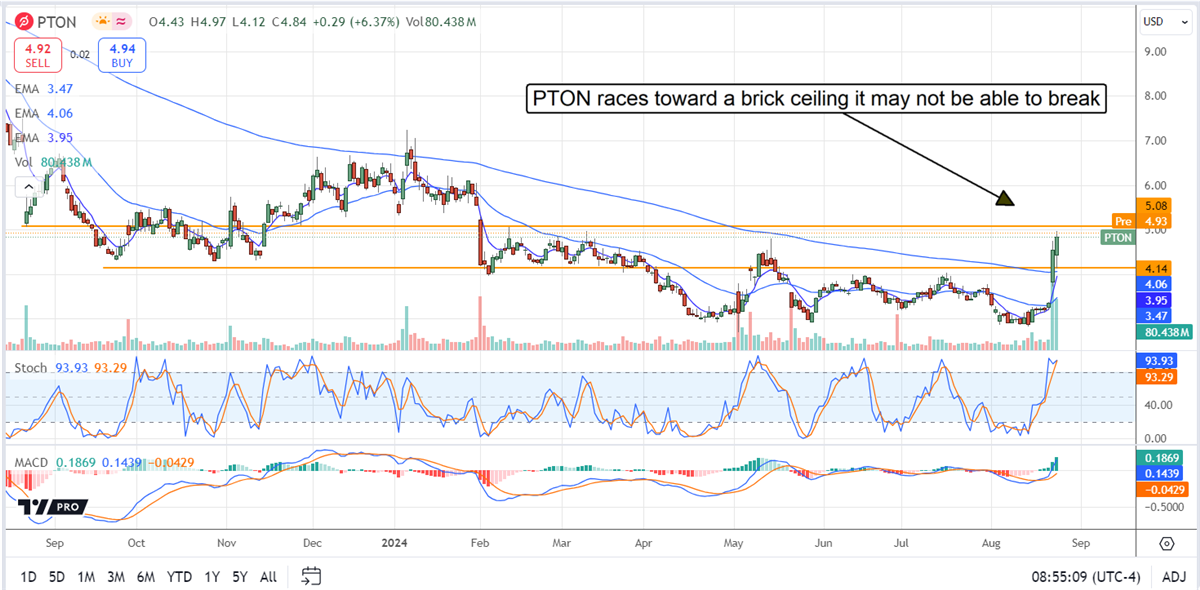
Peloton (NASDAQ: PTON) wowed the market with its FQ4 results, sending its shares up nearly 50% in two days. This indicates a dynamic shift that could increase its price over the coming quarters and years. However, details within the report also point to headwinds that may cap gains today; a sustained rally is unlikely this year. The takeaway is that investors wanting to initiate or add to a position have gotten the signal they were waiting for but are cautioned to wait before pulling the trigger on this discretionary stock.
Among the causes of Peloton’s sharp price increase is short interest. The short interest was running near 20% in the last report and is unlikely to have fallen ahead of the report. The likely scenario is that short-sellers have or are closing out their positions but not switching stances. The likely scenario is that short-sellers are repositioning at the new highs consistent with the top of a trading range and a critical target for resistance. That target coincides with the lower boundary of the price gap formed in February when the company warned growth at scale was challenging.
Peloton Makes Progress on Right-Sizing and Returns to Growth
Peloton had a better-than-expected quarter but not a great one. The company produced $643.6 million in net revenue, outpacing consensus by 370 basis points but growing only 0.2% compared to last year. The return to growth is good and ahead of schedule but unlikely to accelerate over the next year, even if it can be sustained (guidance says it won’t). Product sales have declined by 4%, but this has been offset by a rise in subscriptions driven by growth in after-sales and secondary markets. Total subscriptions grew by 2.3% and exhibited low churn, offset by a substantial decline in paid app subscriptions.
Margin news is another highlight of dubious quality. The company improved its gross margins due to strength in the higher-margin subscription segment and compounded the improvement with reduced costs. The net result is a substantial reduction in net losses, but net losses persist and negatively impact the balance sheet. The good news is that the GAAP loss of $0.08 is a dime better than forecast, and the company pivoted to positive free cash flow, which is expected to continue.
Guidance is another sticking point for the market. The company issued favorable guidance relative to consensus estimates reported by MarketBeat, resulting in upward revisions, but the Q1 and FY revenue targets imply another year of contraction. As it is, the Q1 guide implies a 4% YoY decline expected to accelerate as the year progresses; the full-year revenue guide expects a 10% contraction.
Peloton Reduces Costs at Shareholders' Expense
Peloton is well-capitalized and in no danger of bankruptcy soon, but there are causes for concern. The company reduced its debt load during the quarter, improving its cash flow metrics, but the net result for the period is dilutive for investors. Not only did the shareholder deficit grow by 75%, but the share count is up 5%, and both are likely to grow again in F2025. Execs say they are looking at ways to use their newly freed free cash flow; paying down the debt is where they should start.
The analyst's response to the news is tepid. While most revisions include an increased price target, their consensus is lower than before the release, below the current price action, suggesting the stock is already overpriced. In this scenario, Peloton may not break above its current resistance level without an additional catalyst, which is likely to be the next earnings report due in November. Until then, investors should expect a price pullback that could result in a retest of the range's low end near $3.50. Support should be firm at that target or higher because the institutional activity at that level is bullish.















